A buffer state is a country geographically lying between two rival or potentially hostile great powers.[1] Its existence can sometimes be thought to prevent conflict between them. A buffer state is sometimes a mutually agreed upon area lying between two greater powers, which is demilitarized in the sense of not hosting the military of either power (though it will usually have its own military forces). The invasion of a buffer state by one of the powers surrounding it will often result in war between the powers.
Research shows that buffer states are significantly more likely to be conquered and occupied than are nonbuffer states.[2] This is because "states that great powers have an interest in preserving—buffer states—are in fact in a high-risk group for death. Regional or great powers surrounding buffer states face a strategic imperative to take over buffer states: if these powers fail to act against the buffer, they fear that their opponent will take it over instead. By contrast, these concerns do not apply to nonbuffer states, where powers face no competition for influence or control."[2]
Buffer states, when authentically independent, typically pursue a neutralist foreign policy, which distinguishes them from satellite states. The concept of buffer states is part of a theory of the balance of power that entered European strategic and diplomatic thinking in the 18th century. After the First World War, notable examples of buffer states were Poland and Czechoslovakia, situated between major powers like Germany and the Soviet Union. Lebanon is another significant example, positioned between Syria and Israel, experiencing challenges as a result.[3]
Examples
Americas
.svg.png.webp) Bolivia, created by Gran Colombia as a buffer between Peru and Argentina during the Upper Peru question.[4]
Bolivia, created by Gran Colombia as a buffer between Peru and Argentina during the Upper Peru question.[4] Uruguay, served as a demilitarized buffer between Argentina and the Empire of Brazil during the early independence period in South America.[5][6]
Uruguay, served as a demilitarized buffer between Argentina and the Empire of Brazil during the early independence period in South America.[5][6].svg.png.webp) Paraguay, maintained after the end of the Paraguayan War in 1870, as a buffer separating Argentina and Brazil.[7]
Paraguay, maintained after the end of the Paraguayan War in 1870, as a buffer separating Argentina and Brazil.[7].svg.png.webp) Georgia, a colony established by Great Britain in 1732 as a buffer between its other colonies along the Atlantic coast of North America and Spanish Florida.[8]
Georgia, a colony established by Great Britain in 1732 as a buffer between its other colonies along the Atlantic coast of North America and Spanish Florida.[8] Ecuador, served as a "cushion state" between Colombia and Peru, which had a bigger extension and military force and fought a war in the 1820s in what is now Ecuador.[9]
Ecuador, served as a "cushion state" between Colombia and Peru, which had a bigger extension and military force and fought a war in the 1820s in what is now Ecuador.[9]
Asia
- Multiple buffer states played major roles during the Roman–Persian Wars (66 BC – 628 AD). Armenia was a frequently contested buffer between the Roman Empire (as well as the later Byzantine Empire) and the various Persian and Muslim states.
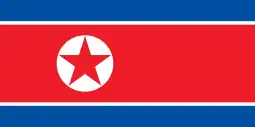 North Korea, during and after the Cold War, has been seen by some analysts as a buffer state between the military forces of China, the Soviet Union and those of South Korea, Japan, and the United States (stationed in South Korea, Japan and Taiwan from 1954 to 1979).[10]
North Korea, during and after the Cold War, has been seen by some analysts as a buffer state between the military forces of China, the Soviet Union and those of South Korea, Japan, and the United States (stationed in South Korea, Japan and Taiwan from 1954 to 1979).[10]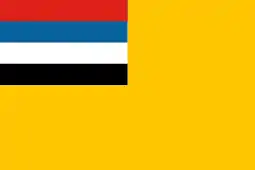 Manchuria was a pro-Japanese buffer state between the Empire of Japan, the Soviet Union, and the Republic of China during World War II.
Manchuria was a pro-Japanese buffer state between the Empire of Japan, the Soviet Union, and the Republic of China during World War II.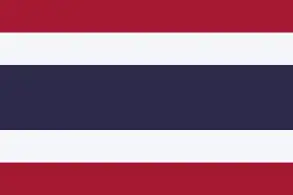 The kingdom of Thailand, historically known as Siam, was an independent buffer state between the British Raj, British Malaya, French Indochina, and their competing colonial interests in Laos and Cambodia.[11][12]
The kingdom of Thailand, historically known as Siam, was an independent buffer state between the British Raj, British Malaya, French Indochina, and their competing colonial interests in Laos and Cambodia.[11][12].svg.png.webp) Korea acted as a buffer zone between the growing superpowers of Imperial Japan and the Russian Empire.
Korea acted as a buffer zone between the growing superpowers of Imperial Japan and the Russian Empire. The Far Eastern Republic was a formally independent state created to act as a buffer between Bolshevik Russia and the Empire of Japan.[13][14]
The Far Eastern Republic was a formally independent state created to act as a buffer between Bolshevik Russia and the Empire of Japan.[13][14].svg.png.webp) Afghanistan was a buffer state between the British Empire, which ruled much of South Asia, and the Russian Empire, which ruled much of Central Asia, during the Anglo–Russian conflicts of the 19th century. Later, the Wakhan Corridor extended the buffer eastwards to the Chinese border.[15]
Afghanistan was a buffer state between the British Empire, which ruled much of South Asia, and the Russian Empire, which ruled much of Central Asia, during the Anglo–Russian conflicts of the 19th century. Later, the Wakhan Corridor extended the buffer eastwards to the Chinese border.[15]- The Himalayan nations of
 Tibet,
Tibet, 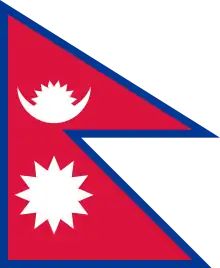 Nepal,
Nepal,  Bhutan, and
Bhutan, and .svg.png.webp) Sikkim were buffer states between the British Empire and China. Later, in the Sino-Indian War of 1962, they became buffers between China and India as the two powers fought along their borders.[16][17]
Sikkim were buffer states between the British Empire and China. Later, in the Sino-Indian War of 1962, they became buffers between China and India as the two powers fought along their borders.[16][17]  Mongolia acted as a buffer between the Soviet Union and China until 1991. It currently serves as a buffer between Russia and China.[18]
Mongolia acted as a buffer between the Soviet Union and China until 1991. It currently serves as a buffer between Russia and China.[18] Lebanon is a buffer state between Israel and Syria.
Lebanon is a buffer state between Israel and Syria. Iraq and
Iraq and  Bahrain are buffer states between Iran and Saudi Arabia.[19][20]
Bahrain are buffer states between Iran and Saudi Arabia.[19][20]
Africa
_(1554-1659).svg.png.webp) Morocco served as a buffer state between the Ottoman Empire, Spain, and Portugal in the 16th century.[21]
Morocco served as a buffer state between the Ottoman Empire, Spain, and Portugal in the 16th century.[21]- Bechuanaland Protectorate (present-day
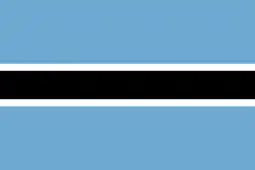 Botswana) was initially created by the British Empire as a buffer between the British Empire and the two Boer republics of Orange Free State and Transvaal Republic until the Second Boer War.[22]
Botswana) was initially created by the British Empire as a buffer between the British Empire and the two Boer republics of Orange Free State and Transvaal Republic until the Second Boer War.[22]
Europe
.svg.png.webp) Switzerland has been a buffer state between Italy, Austria, France, Germany, and other state powers in medieval and modern Europe.
Switzerland has been a buffer state between Italy, Austria, France, Germany, and other state powers in medieval and modern Europe. The United Kingdom of the Netherlands, composed of today's Belgium and Netherlands, was created by the Congress of Vienna in 1815 to maintain peace between France, Prussia, and the United Kingdom. The kingdom existed for 15 years until the Belgian revolution
The United Kingdom of the Netherlands, composed of today's Belgium and Netherlands, was created by the Congress of Vienna in 1815 to maintain peace between France, Prussia, and the United Kingdom. The kingdom existed for 15 years until the Belgian revolution.svg.png.webp) Belgium acted as buffer state between France, German Empire, Netherlands, and British Empire before the First World War
Belgium acted as buffer state between France, German Empire, Netherlands, and British Empire before the First World War- The Rhineland served as a demilitarized zone between France and Germany during the inter-war years of the 1920s and early 1930s. There were early French attempts at creating a Rhineland Republic.[23]
- The Socialist Soviet Republic of Byelorussia was founded as a buffer state between Soviet Russia and European powers.[24]
- The Qasim Khanate (1452-1681) may have served as a buffer between Muscovy and the Kazan Khanate.[25]
 Austria acted as a buffer state between Germany and Italy during the interwar period.
Austria acted as a buffer state between Germany and Italy during the interwar period..svg.png.webp) Poland and other states between Germany and the Soviet Union have sometimes been described as buffer states, both as non-communist states before World War II[26] and later as socialist states of the Eastern Bloc.[27]
Poland and other states between Germany and the Soviet Union have sometimes been described as buffer states, both as non-communist states before World War II[26] and later as socialist states of the Eastern Bloc.[27].svg.png.webp) Yugoslavia, which broke with the Soviet Union before the Warsaw Pact, became a buffer state between NATO and the Eastern Bloc during the Cold War.
Yugoslavia, which broke with the Soviet Union before the Warsaw Pact, became a buffer state between NATO and the Eastern Bloc during the Cold War. West Germany and
West Germany and  East Germany were also regarded as buffer states between NATO and the Warsaw Pact during the Cold War period in Europe.
East Germany were also regarded as buffer states between NATO and the Warsaw Pact during the Cold War period in Europe.- During the Cold War,
 Sweden and
Sweden and  Finland were sometimes regarded as buffer states between NATO and the Soviet Union. More recently, the Russo-Ukrainian War has helped push both countries into joining NATO.
Finland were sometimes regarded as buffer states between NATO and the Soviet Union. More recently, the Russo-Ukrainian War has helped push both countries into joining NATO.
Oceania
 New Hebrides served as buffer between United Kingdom and France in Oceania during the New Imperialism period
New Hebrides served as buffer between United Kingdom and France in Oceania during the New Imperialism period Papua New Guinea served as buffer state between Indonesia, the Solomon Islands, and Vanuatu. Indonesia accused both the Solomon Islands and Vanuatu of supporting the Free Papua movement during the Papua Conflict.[28]
Papua New Guinea served as buffer state between Indonesia, the Solomon Islands, and Vanuatu. Indonesia accused both the Solomon Islands and Vanuatu of supporting the Free Papua movement during the Papua Conflict.[28]
See also
- Indian barrier state, a British proposal to establish a Native American buffer state in the Great Lakes region of North America during the 18th and early-19th centuries
- Limitrophe states
- Puppet state
- Satellite state
- Neutral and Non-Aligned European States
References
- ↑ "buffer state". Merriam Webster. Retrieved 11 September 2021.
- 1 2 Fazal, Tanisha M. (2004-04-01). "State Death in the International System". International Organization. 58 (2): 311–344. doi:10.1017/S0020818304582048. ISSN 1531-5088. S2CID 154693906.
- ↑ "The A to Z of international relations". The Economist. Retrieved 2023-11-27.
- ↑ Bolivia (1826). "Colección oficial de leyes, decretos, ordenes, resoluciones &c. Que se han expedido para el regimen de la Republica Boliviana".
- ↑ "Uruguay - From Insurrection to State Organization, 1820-30". countrystudies.us. Retrieved 3 March 2017.
- ↑ Phelps, Nicole (1 January 2014). "Review of Knarr, James C., Uruguay and the United States, 1903-1929: Diplomacy in the Progressive Era". www.h-net.org. Retrieved 3 March 2017.
- ↑ "Paraguay: Regional Geopolitics and a New President". Stratfor. Retrieved 3 March 2017.
- ↑ "The Colonies | Georgia". www.smplanet.com. Retrieved 20 November 2015.
- ↑ Zepeda, Beatriz (2009). Ecuador: Relaciones exteriores a la luz del bicentenario. ISBN 9789978672242.
- ↑ "Getting China to Become Tough with North Korea". Cato Institute. Retrieved 2016-02-10.
- ↑ Pholsena, Vatthana (2007). LAOS, From Buffer State to Crossroads. Silkworm Books. ISBN 978-9749480502.
- ↑ Macgregor, John (1994). Through the Buffer State : Travels in Borneo, Siam, Cambodia, Malaya and Burma. White Lotus Co Ltd; 2 edition. ISBN 978-9748496252.
- ↑ Alan Wood, "The Revolution and Civil War in Siberia," in Edward Acton, Vladimir Iu. Cherniaev, and William G. Rosenberg (eds.), Critical Companion to the Russian Revolution, 1914–1921. Bloomington, IN: Indiana University Press, 1997; pp. 716–717.
- ↑ George Jackson and Robert Devlin (eds.), Dictionary of the Russian Revolution. Westport, CT: Greenwood Press, 1989; pp. 223–225.
- ↑ Debarbieux, Bernard; Rudaz, Gilles; Todd, Jane Marie; Price, Martin F. (2015-09-10). The Mountain: A Political History from the Enlightenment to the Present. University of Chicago Press. p. 150. ISBN 9780226031118.
- ↑ "Nepal: Dictated by Geography | World Policy Institute". www.worldpolicy.org. Archived from the original on 2017-08-31. Retrieved 2016-02-10.
- ↑ The World Today; Bhutan and Sikkim: Two Buffer States Vol. 15, No. 12. Royal Institute of International Affairs. 1959. pp. 492–500.
- ↑ "Mongolia, the uncontested buffer state". Russia Direct. Archived from the original on 4 February 2019. Retrieved 3 March 2017.
- ↑ Kader, Ariz (July 2019). "Iraq: Battleground or Buffer State?". CIDOB.
- ↑ "Bahrain as the area of Saudi‑Iranian rivalry in the second decade of the 21st century". Studia Politicae Universitatis Silesiensis.
- ↑ Cory, Stephen (2016). Reviving the Islamic Caliphate in Early Modern Morocco. Routledge. pp. 36–37. ISBN 9781317063438.
- ↑ Ram, J.R. (16 March 2019). "Botswana: The best kept African secret". The Telegraph.
- ↑ "THE RUHR: Rhineland Republic?". Time. 27 August 1923. Retrieved 12 March 2017.
- ↑ Andrew Wilson (2011). Belarus: The Last European Dictatorship. pp. 96–97. ISBN 978-0-300-13435-3.
- ↑ Witzenrath, Christoph (2016). Eurasian Slavery, Ransom and Abolition in World History, 1200-1860. Routledge. p. 198. ISBN 9781317140023.
- ↑ Suvorov, Viktor (2013). The Chief Culprit: Stalin's Grand Design to Start World War II. Naval Institute Press. p. 142. ISBN 9781612512686. Retrieved 1 January 2015.
Chapter 25: Destruction of the Buffer States between Germany and the Soviet Union.
- ↑ Stent, Angela E. (1998). "Russia and Germany Reborn: Unification, the Soviet Collapse, and the New Europe". Princeton University Press. Archived from the original on 18 October 2014. Retrieved 1 January 2015.
Moscow's German Problem before Detente - The Federal Republic - In 1945, the major Soviet preoccupation was to prevent any future German attack; hence the imposition of Soviet-controlled governments in a ring of buffer states between Germany and the USSR.
- ↑ "Papua Nugini Diharapkan Jadi Bufferzone Indonesia" [Indonesia Hopes Papua New Guinea to be Indonesia's Buffer Zone] (in Indonesian). Retrieved 18 October 2017.